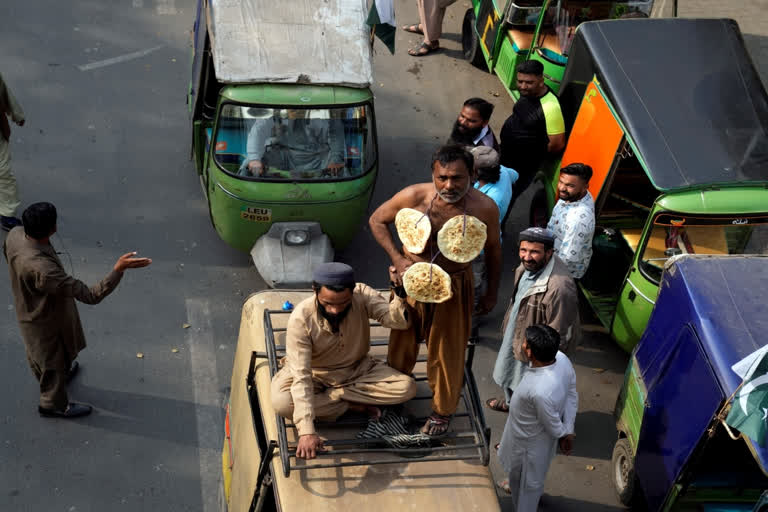The present economic crisis haunts Pakistan and the Kashmiri separatists equally as the latter have garnered refuge in the country for its leaders so that they can launch their offensive against India from there. In fact, Pakistan's finances have gone incredibly unstable, and the country is on the verge of going bankrupt. The drying up of finances have added to the existing political turmoil which the country has been undergoing for a while.
Separatism-While the country supported the Kashmir separatist movement, a plague of secessionism had grown within its own borders due to tribal alienation from the frontier areas. As the saying goes, you need to have two bullets while embarking on a mission of revenge, one for the enemy and another for yourself. Pakistan wanted to avenge India for what India did in 1971 when it supported separatist movement for Bangladesh nation, then East Pakistan. Pakistan reciprocated with supporting Khalistan movement in 1980’s, which was an unsuccessful attempt to divide India over the Sikhs' demand for their own country. Islamabad shifted its attention to its old target region, Kashmir, in late 1980’s though it had been attempting to integrate Kashmir many times before.
K-factor- Kashmir works well for Pakistani politicians and helps those who took sides with Kashmir separatism in their electoral politics. It is an evident fact that anyone who showed resentment for Kashmir had to face the nation's wrath. When the entire country is severely suffering from deep economic crisis, it still holds the same position on Kashmir.
In the UNGA on Feb. 23, Pakistan raised the Kashmir issue once more, reiterating their stand that they will pursue it regardless of whether the nation’s financial situation improves or not.
Lack of political will- Pakistan has literally forgotten that internal and external conflicts have virtually drained its resources and is like a termite to its economy. The recent floods have exacerbated and made the finances of the country worse. Pakistan spends a large portion of its budget on the military because they need to manage a white elephant that they have been taming since the country's founding while also containing separatism on their frontier side and keeping tight watch on borders touching Afghanistan. Any political party in Pakistan relies on the separatist in Kashmir, and no leader can afford to speak out against it. Not even now, when Pakistan as a whole is on the point of collapsing. Although the country's very existence is in jeopardy, its Kashmir policy is still valid.
Sponsoring terror- The United Jihad Council, an amalgam of multiple small militant organisations in Kashmir, has its base in Pakistan, where the council's leader, Syed Salahudin, has lived for more than 20 years. This umbrella of the separatist groups was made for economic reasons to allow more money to enter into Kashmir. With a split strategy, more money was to be made. The JKLF, Hizb, and Tehreek ul Mujahideen etc were divided into numerous factions under different leaders because each faction was eligible to receive a separate grant.
Paucity in funds- Given the current economic crisis and inflation that the country is experiencing, the challenge would be to maintain separatist camps that are operating covertly in Islamabad and elsewhere. Kashmir militant groups have their representatives in Pakistan and may likely face the heat of the financial crisis as the country is going to have difficulty to feed the leaders of the separatist groups, including their chief commanders.
Societal impact- Apart from Kashmiri separatist leadership in the country, inflation is going to widen the divide between the rich and the poor as huge disparity already exists between the two classes of the society. This remains true about the cadres and the leaders of Kashmir living in various parts of the Pakistan.
Inflation- There has been almost close to 30 percent of price rise in essential commodities making it hard for people to keep their kitchen going. One third of the population is already facing poverty and have, in fact reached to a level of borrowing from others — even to a level of begging. The salaried class which have their salaries stagnant with daily increase in the daily commodities. The IMF also brought up the issue of inflation with the negotiating team during the meeting after Pakistan's request to the group for a bailout from the crisis.
IMF bailout- The International Monitory Fund, an international lender, and the Pakistani government's agreement are unlikely to be finalised since Kristalina Georgieva, the director of the IMF, has set several conditions before she would formally agree to step in to save the country from plunging into a bankruptcy. She has set several conditions, including raising taxes on the wealthiest individuals' income and providing aid to the poor who are in need. The IMF's proposal, if agreed, would have a long-lasting impact on the ruling party since it would be perceived as a persecution of the wealthy. She has shown her displeasure over the price rise which is believed to have mostly affected the poor.
Disintegration- The Kashmiri militant leaders' mysterious killing a week ago in Rawalpindi is an indication that things are not going well between Pakistan and the separatist camp. The disorder has already begun. In Rawalpindi, Syed Salahudin, chief of Jehad Council, a 'designated terrorist' who is on a watch list, was seen leading the militant's funeral. His public appearance completely goes awry for the nation considering that it has worked hard to go off the FATF-grey list.



